
Letters on Materials
Scope & Guideline
Bridging theory and practice in materials research.
Introduction
Aims and Scopes
- Materials Characterization and Properties:
Research articles often explore the structural, mechanical, electrical, thermal, and magnetic properties of various materials, providing insights into their behaviors under different conditions. - Advanced Manufacturing Techniques:
The journal frequently publishes studies on modern manufacturing processes such as additive manufacturing, laser processing, and ultrasonic welding, highlighting their effects on material properties and performance. - Nanomaterials and Composites:
There is a strong emphasis on the development and analysis of nanostructured materials and composites, investigating their unique characteristics and potential applications in various fields. - Phase Transformations and Microstructural Evolution:
Many papers delve into the mechanisms of phase transformations and microstructural changes in materials, including the effects of processing techniques and external conditions. - Functional and Smart Materials:
The journal features research on materials with specific functionalities, including shape memory alloys, thermoelectric materials, and coatings with tailored properties. - Theoretical and Computational Studies:
Numerical simulations and theoretical analyses are commonly employed to predict material behavior and guide experimental investigations.
Trending and Emerging
- Additive Manufacturing and 3D Printing:
There is a marked increase in research related to additive manufacturing techniques, particularly in the context of producing complex geometries and tailored material properties for various applications. - Nanotechnology and Nanocomposites:
The trend towards utilizing nanotechnology is growing, with a focus on developing nanocomposites that enhance the mechanical, electrical, and thermal properties of materials. - Smart and Functional Materials:
Research on materials with adaptive functionalities, such as shape memory alloys and thermoelectric materials, is on the rise, driven by their potential applications in smart technologies. - Sustainability and Green Materials:
Emerging themes include the development of sustainable materials and processes, reflecting a growing concern for environmental impacts and resource efficiency in materials science. - Computational Materials Science:
The use of computational methods and simulations to predict material behavior and guide experimental work is becoming increasingly prominent, indicating a shift towards data-driven research methodologies.
Declining or Waning
- Traditional Metallurgy:
Research centered around conventional metallurgical processes and basic alloy systems appears to be declining, possibly due to the increasing popularity of advanced materials and innovative processing techniques. - Low-Temperature Applications:
The focus on low-temperature applications and related materials has waned, as more studies shift towards high-performance materials for extreme conditions and applications. - Biomaterials from Conventional Sources:
There has been a noticeable decrease in studies related to biomaterials derived from traditional sources, with a shift towards synthetic and engineered biomaterials that offer enhanced properties and functionalities. - Basic Polymer Studies:
Research on basic polymer properties and applications has seen a reduction, as the field moves towards more complex composite materials and hybrid systems.
Similar Journals

METALS AND MATERIALS INTERNATIONAL
Driving excellence in materials research since 1996.METALS AND MATERIALS INTERNATIONAL, published by the Korean Institute of Metals and Materials, is a prestigious journal dedicated to the advancement of research in the fields of materials science and engineering. With an ISSN of 1598-9623 and a robust e-ISSN of 2005-4149, this journal has established itself as a crucial platform for disseminating innovative findings and key advancements that span condensed matter physics, materials chemistry, mechanics of materials, and the technology of metals and alloys. Its Q1 rankings in multiple categories attest to its high impact and relevance in the academic community, placing it among the top journals in its fields with Scopus rankings that reflect a strong international footprint. Here, researchers, professionals, and students can access cutting-edge research and insights, fostering collaboration and exploration of new materials and their applications. With a commitment to excellence and a convergence of knowledge from 1996 to 2024, METALS AND MATERIALS INTERNATIONAL continues to enhance our understanding of materials and their transformative impact on technology and engineering.
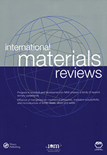
INTERNATIONAL MATERIALS REVIEWS
Elevating Standards in Materials ResearchINTERNATIONAL MATERIALS REVIEWS, published by SAGE Publications Inc, is a leading journal dedicated to the comprehensive analysis of contemporary research in the fields of materials chemistry, mechanical engineering, mechanics of materials, and the study of metals and alloys. With an impressive impact factor and a Q1 ranking across multiple categories such as Materials Chemistry and Mechanical Engineering in 2023, it ranks amongst the top journals for innovative materials research. The journal has a long-standing history since its inception in 1987 and continues to serve as a crucial resource for academics and professionals alike. Although it is not open access, it is renowned for its rigorous peer-review process and its commitment to disseminating high-quality materials science research globally. Researchers, students, and industry professionals benefit greatly from the journal's insightful reviews, both for the advancement of theoretical knowledge and practical applications within the fast-evolving materials field.

MATERIALE PLASTICE
Transforming Ideas into Material SolutionsMATERIALE PLASTICE is a distinguished academic journal published by REVISTA CHIMIE SRL in Romania, focusing on the fields of Chemistry, Materials Science, and Engineering. With an ISSN of 0025-5289 and an E-ISSN of 2668-8220, this journal has a historical commitment to advancing the study of polymers and plastics since its inception in the early 1970s. Although classified in the Q4 category across multiple disciplines including miscellaneous chemistry and materials chemistry as of 2023, it serves as an important forum for researchers and professionals dedicated to innovative materials research and development. The journal’s resources, though not openly accessible, are pivotal for scholars seeking to deepen their knowledge in the mechanics of materials and interdisciplinary applications. MATERIALE PLASTICE is not only a repository of significant research findings but also a platform for fostering collaboration and discussion among a global audience that continues to strive for scientific excellence in polymer and materials studies.
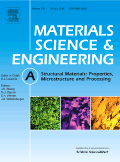
MATERIALS SCIENCE AND ENGINEERING A-STRUCTURAL MATERIALS PROPERTIES MICROSTRUCTURE AND PROCESSING
Transforming Research into Revolutionary Materials InsightsMATERIALS SCIENCE AND ENGINEERING A-STRUCTURAL MATERIALS PROPERTIES MICROSTRUCTURE AND PROCESSING, published by ELSEVIER SCIENCE SA, is a highly regarded journal specializing in the fundamental and applied aspects of materials science. Since its inception in 1988, this journal has established itself as a leading platform for disseminating innovative research findings, particularly focused on structural materials, their properties, microstructure, and processing techniques. With a prominent impact in the field, it ranks in the Q1 category across several disciplines including Condensed Matter Physics, Materials Science, Mechanical Engineering, and Nanoscience and Nanotechnology, highlighting its significance and influence within the academic community. The journal is accessible to a global audience of researchers, professionals, and students, underscoring its commitment to advancing knowledge in materials engineering. Aspiring authors and readers will find this journal an essential resource for cutting-edge research and the latest advancements in the field, further supported by its impressive Scopus rankings that place it among the top-tier publications.
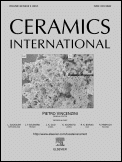
Ceramics International
Advancing materials science through innovative ceramics research.Ceramics International is a premier journal published by ELSEVIER SCI LTD, focusing on advancing the field of materials science with a specific emphasis on ceramics and composites. With an impressive impact factor and a top-tier standing in several critical categories, including Q1 rankings in Ceramics and Composites, Electronic, Optical and Magnetic Materials, and Materials Chemistry, this journal serves as a crucial resource for researchers and professionals alike. Established in 1981, it has consistently showcased cutting-edge research in various domains, including surfaces, coatings, and process chemistry technologies, making it invaluable for those advancing theoretical and practical knowledge in these areas. While access is through subscription, the journal’s rich content, profound insights, and rigorous peer-review process ensure high-quality articles that contribute meaningfully to the scientific community. By fostering innovation and collaboration through rigorous research, Ceramics International stands out as an authoritative source for those dedicated to the evolution of materials science.
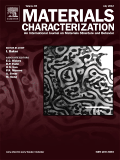
MATERIALS CHARACTERIZATION
Connecting Scholars and Industry for Impactful InsightsMATERIALS CHARACTERIZATION is a leading international journal dedicated to the advancement of knowledge in the field of materials science and engineering. Published by Elsevier Science Inc, this esteemed journal has been disseminating vital research since 1970 and continues to be essential for scholars and industry professionals alike. With an impressive impact reflected in its Q1 quartile rankings across several categories—including Condensed Matter Physics, Materials Science, Mechanical Engineering, and Mechanics of Materials—MATERIALS CHARACTERIZATION stands out as a premier outlet for innovative studies and technical advancements. Researchers can access a wealth of peer-reviewed articles that explore properties, characterization techniques, and applications of materials, fostering interdisciplinary collaboration. With a commitment to high-quality research and comprehensive review processes, the journal plays a crucial role in shaping the future of materials science, making it an invaluable resource for anyone invested in this dynamic field.
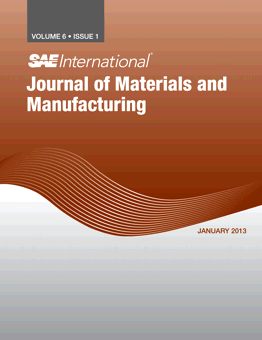
SAE International Journal of Materials and Manufacturing
Pioneering Discoveries in Materials and Manufacturing TechniquesSAE International Journal of Materials and Manufacturing, published by SAE International, is a leading peer-reviewed journal that focuses on the advancements and research in the fields of materials science and manufacturing engineering. With ISSN 1946-3979 and E-ISSN 1946-3987, this journal is an essential resource for researchers, professionals, and students who are keen on exploring innovative materials and modern manufacturing techniques. Although the journal currently does not offer open access options, its rigorous selection process ensures the publication of high-quality papers that contribute significantly to the knowledge base in the industry. Recognized within the third and fourth quartiles across various engineering categories, including Industrial and Manufacturing Engineering and Mechanical Engineering, the journal provides an impactful platform for disseminating groundbreaking research. With a converged history since 2002 and a comprehensive approach to critical topics in mechanics of materials, it empowers the academic community with vital insights, trends, and methodologies that propel the future of manufacturing excellence.

Functional Composites and Structures
Advancing the Future of Material Innovation.Functional Composites and Structures is a prestigious academic journal published by IOP Publishing Ltd, dedicated to advancing the field of materials science with a focus on innovative composite materials and their structural applications. Established in 2019 and running through 2024, this journal uniquely bridges several disciplines, consistently ranking in the Q2 quartile across key categories including Ceramics and Composites, Electronic, Optical and Magnetic Materials, and Mechanics of Materials. With a commendable Scopus rank that places it within the top tiers of its field, the journal is instrumental for researchers, engineers, and scholars seeking to explore the latest developments in material properties, functionality, and applications. Although access options are not specified, the open-access nature of the journal promotes wider dissemination and engagement with cutting-edge research. As the demand for smarter, more efficient materials continues to grow, Functional Composites and Structures serves as a vital resource for fostering collaboration and driving innovation in material sciences.

Journal of Metals Materials and Minerals
Fostering Insights in the World of Materials and MineralsJournal of Metals Materials and Minerals (ISSN: 0857-6149) is a renowned academic publication dedicated to the interdisciplinary fields of metallurgical science, materials engineering, and mineralogy. Published by Chulalongkorn University, Metallurgy & Materials Science Research Institute in Thailand, this journal serves as a pivotal platform for researchers to disseminate their findings and explore innovative applications related to metals, ceramics, polymers, and biomaterials. Although the journal does not currently adopt an open-access model, it provides insightful content that facilitates knowledge sharing among professionals and academics alike. The journal has established its credibility with impressive Scopus ranking percentiles, particularly in categories such as Metals and Alloys and Ceramics and Composites. With an emphasis on advancing the understanding of materials science from 2017 to 2024, the Journal of Metals Materials and Minerals remains an essential resource for those striving to contribute to and stay informed about the latest trends and breakthroughs in these dynamic fields.

Materialia
Pioneering research for a sustainable future.Materialia is a prestigious peer-reviewed journal published by Elsevier Science Ltd, dedicated to advancing the field of materials science. With its ISSN 2589-1529, this journal has carved out a prominent place in academic research since its inception in 2018, and continues to evolve as it converges towards its 2024 objectives. Located in the Netherlands, Materialia holds a commendable Q2 ranking in the 2023 category of Materials Science (miscellaneous) and is positioned at the 72nd percentile among general materials science journals, ranking #128 out of 463 in Scopus. This accessibility to cutting-edge research and insights makes it vital for researchers, professionals, and students aiming to stay abreast of developments in this dynamic domain. While the journal operates on a traditional access model, it emphasizes the importance of rigorous peer review, ensuring that only the highest quality research is disseminated. Materialia serves as an essential platform for the exploration of novel materials, their properties, and applications, fostering innovation and collaboration within the scientific community.